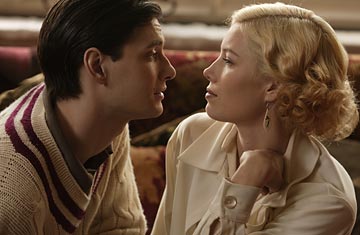
Jessica Biel and Ben Barnes in Easy Virtue
This week Jessica Biel was quoted on the subject of her beauty, which she said has gotten in the way of being considered for some parts. Easy Virtue, Stephan Elliott's uneven but charming adaptation of the Noel Coward play, is going to do nothing to dissuade the public of her extreme good fortune in the looks department. Striding around in wide-legged trousers or smiling from under some exquisite little cloche, she is dazzling on the level that makes you think perhaps that whole business with Helen of Troy wasn't so far-fetched. (See TIME's coverage of the 62nd Cannes Film Festival.)
But as Larita, the exotic American divorcée who sends her new upper-crust English in-laws into fits, Biel is more than just a pretty face. She's funny and poised, rather than simply posed, as so often is the result when directors are confronted with someone who makes everyone else look like mutton. There are a few moments when you sense the nervous tension inherent in an actress trying to make a breakthrough that could and should change her career, but they are outweighed by the number of times she's in command. She also has the most memorable scene involving a household pet since the time Christopher sat on Adriana's dog in the The Sopranos — this one's funnier. (From the newest movies to music, see TIME's summer arts preview.)
The film itself is less of a revelation, a revisiting of familiar types and scenarios that are nicely executed but not exactly relevant beyond the pleasure of nostalgia. The Whittaker family members are classic examples of interwar, edging-toward-shabby English gentry, ready to be jolted into 20th century reality. The scissors-sharp matriarch (Kristen Scott Thomas) thoroughly disapproves of her son John's (Ben Barnes) taste in brides. He was supposed to marry Sarah (Charlotte Riley), the girl from the next castle over, who could have restored the family to its former glory. Instead he shows up with Larita, a race-car-driving native of Detroit who doesn't want to play lawn tennis, is a fan of Lady Chatterley's Lover and demands to know the cook's name ("Cook, I can't call you by a verb").
Colin Firth plays John's father Jim, a sardonic, kindly and unkempt World War I vet who dallied with French whores at war's end before being fetched home. John's daffy older sister Marion (Katherine Parkinson, whose voice is as treacherously sweet as cotton candy) is halfway to becoming a Miss Havisham. The youngest Whittaker is Hilda (Kimberley Nixon), who is both jealous of Larita and bewitched by her and is, in her troublemaking, a clear precursor to Briony of Ian McEwan's Atonement, written nearly 75 years after Coward's play.
Elliott adapted Easy Virtue with co-writer Sheridan Jobbins and has been respectful to the basic plot (although he brightens up the ending) and to Coward's gift with a bon mot. "We try not to speak of it," John tells Larita, referencing his father's disgraceful postwar doings in France. "Except in public." I do not have a copy of the original play on hand, but if that isn't lifted straight out of Coward, I'll eat Larita's cloche. (Not until after I've worn it a bit though. Charlotte Walters' costumes are perfection.) I suspect this is also the case with almost every line uttered by Furber the butler, played by the droll and dry Kris Marshall.
There is, however, something problematic about Coward, at least as viewed from a 21st century perspective. The zingers are so constant and sharp that everyone has, of necessity, donned emotional armor, but unfortunately, that also tends to keep the audience at a distance. Even Larita, who is so likable thanks to Biel, is a bit of an emotional mystery. She tells us why she married John, but we still aren't sure what she could have seen in him; he's almost embarrassingly boyish. (Biel is actually a few months younger than Barnes, although from her sophistication you'd never know it.) Because of the comedy of the language and Elliott's light, eager pacing, the darker issues underlying Coward's original, about the ugliness of class and reputation and rebellion, seem more extraneous than perhaps they should.
But if you've got a mother of a certain generation, whisk her away for a matinee. She will sigh and speak of Cole Porter — his music punctuates many scenes, and indeed, there are moments when you fear Barnes is going to deliver a full number — and she will immediately forgive you for that unfortunate scarf you bought her for Mother's Day.
